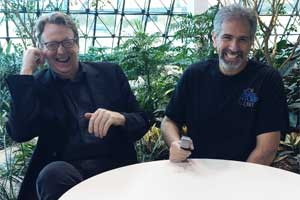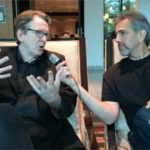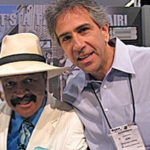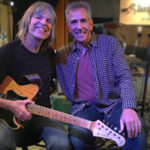Long-time anchor for Dave Weckl recounts his career highlights, from Freddie Hubbard and Dizzy Gillespie to Steps Ahead, Mike Stern and more
Exclusive interview with FBPO’s Jon Liebman
August 6, 2012
A native of St. Louis, MO, Tom Kennedy is widely regarded as one of the top acoustic and electric bass players in the world. While still a young man, Tom found himself holding down the bass chair for jazz legends Freddie Hubbard, James Moody, Nat Adderley, Sonny Stitt and Stan Kenton. Upon migrating to New York City, Tom quickly gained work with multiple groups and soon found himself recording with guitar great Bill Connors and touring with the likes of Michael Brecker, Tania Maria and Al DiMeola.
In 1998, Tom became an integral part of drummer Dave Weckl’s band, with which he toured, composed and recorded for over nine years. Tom has also performed and recorded with top contemporary players Simon Philips, Steve Gadd, Frank Gambale, Steve Lukather, David Sanborn, Jeff Lorber, Ricky Lawson and Joe Sample, as well as fusion band Planet X. He is a frequent participant at numerous international jazz festivals, including Montreaux, North Sea and Paris.
Kennedy has released three solo CDs: Basses Loaded in 1996, Bassics, with Mundell Lowe and Jo LaBarbera in 2004, and, most recently, Just For the Record, in late 2011, featuring Dave Weckl, Mike Stern and Charles Blenzig. LA Weekly describes Tom’s playing as “nothing short of inspiring.”
FBPO: Tell me about your musical upbringing.
TK: I was very blessed to have grown up in such a nurturing musical environment. My father was a jazz trumpet player for years before settling down in St. Louis to open a retail music business. My mother was also quite musical and was always taking my siblings and me to various musical events and shows. We always referred to our house as the “Kennedy Music Conservatory” and, with all of the practicing going on all hours of the day, it pretty much was!
It wasn’t long before we had carved out a niche for ourselves in the local music community of our hometown. My brother (Ray) and I were soon in demand as a first-call local backup band for some pretty big-name jazz artists, including James Moody, Sonny Stitt, Freddie Hubbard and Nat Adderley.
FBPO: St. Louis has quite a rich musical heritage, particularly for the blues. How would you say growing up in that environment influenced you, musically?
TK: It was great growing up in such a music town. There were local legends performing on any given night, along with national artists coming through on a regular basis. There were countless opportunities to experience great musicians live, which is an essential part of any young musician’s growth. There is no greater inspiration!
FBPO: How did you become a bass player?
TK: I was singing bass parts to Beatles records when I was 4 or 5 years old – don’t ask me why! I was just always drawn to the depth of the bass. It was inevitable when my brother was asked to play the double bass in his middle school orchestra and brought it home to practice. I remember being completely fascinated seeing that huge instrument propped up in a corner of our music room. I just remember plucking a couple of strings and experiencing that deep tone and vibration. I was hooked! In fact, my brother pretty much handed the instrument over to me within a week or so, as it was obvious who the bassist in the family was going to be!
FBPO: Who were your influences as a young, up-and-coming student of bass?
TK: My strongest influence was also my first influence, my lifelong mentor, bassist Jerry Cherry. I first heard him in concert just weeks after starting to learn the instrument. A St. Louis legend, Jerry had such an amazing command and understanding of the instrument, was always incredibly musical and could swing as hard as anyone you’ve ever heard. In fact, it was he who introduced me to many legendary bassists who also became extremely influential in my playing, such as Ray Brown, Milt Hinton, Eddie Gomez, Leroy Vinnegar and Scott LaFaro.
FBPO: Were you into jazz from the very beginning, or did you start out in the traditional way, with the bow, Simandl, etc.?
TK: My dad was a Dizzy Gillespie fan, so my brother and I were listening to Diz, Clifford Brown and Charlie Parker from a very early age. Yeah, I was definitely jazz-based from the very beginning. In fact, the first song I learned was “The Swingin’ Shepherd Blues.” There was definitely nothing traditional or by-the-book regarding my early growth. I just got the notes out any way I could and was always much more concerned with time, note choices and feel than correct technique. The concentration of hand positioning and precision happened quite a bit later.
FBPO: You were still quite young when you started doing gigs with artists like Freddie Hubbard, James Moody, Stan Kenton and the others that you mentioned. How did your career begin to take off?
TK: Those experiences were really the thing that propelled me. Given the chance to play with those people, I began to meet other players and was soon connected into a pretty healthy network of top musicians.
I met Peter Erskine at a Stan Kenton jazz camp when I was quite young and we would occasionally get together for jam sessions when Kenton came through St. Louis. It was because of those early playing situations that he and I reconnected just before my relocation to New York, which ultimately led to me being asked to play with the legendary Steps Ahead.
FBPO: How did you discover the electric bass?
TK: My dad sold electric basses at the music store, but I was so deep into upright and the mainstream jazz thing that I never really had any interest in the instrument. That is, until the day a guy walked into my father’s music store and asked to try out a sunburst jazz bass hanging on the wall. I didn’t think much about it, as many people tried out instruments on a daily basis. But when this guy started slapping and popping, I was captivated! I’d never seen or heard anything like it before. The sound, especially the groove, just cut right to my core. I was still floating on a cloud as the guy, quite intuitively, yelled across the store, “Check out Larry Graham,” just before walking out the door.
It was at that moment that I discovered the electric bass. Of course, I bought every Larry Graham album I could find and eventually began to search out other players and styles of electric bass playing.
FBPO: Once you became known as a competent doubler on both electric and upright bass, I imagine it was like a whole new world opened up to you!
TK: That’s very true. In fact, I noticed that I looked at the acoustic bass so much differently as I became more versed on electric, and vice versa. There are endless similarities, but each has its distinctive characteristics. I think the true doubler is one that can really pinpoint both similarities and differences.
I love pushing the envelope, playing something funky or gritty on upright, as well as playing mainstream jazz on electric. It really opens up so many new possibilities, as well as just further ingraining my love for both instruments.
FBPO: What kind of basses are you playing these days?
TK: In regards to electric basses, I’ve had the pleasure of playing Fodera instruments for twenty-eight years! I remember Vinnie and Joey presenting me with the very first 5-string bass they ever made in late 1984 and I have never looked back. My signature model Fodera “Emperor” 5-String was released in 1994. I also record and perform with the brand new “Emperor Standard” 5-string with bolt-on neck.
I have two acoustic basses. One is an instrument my parents purchased for me after realizing I was hooked at age 8! It’s a late ’20s German instrument and is great for local work and travel. It has been featured on many recordings through the years. My other instrument is a vintage Bohemian bass, circa 1780. This is a very special instrument to me, as it belonged to my lifelong mentor and great bassist, Jerry Cherry. A truly great recording instrument, but very fragile. It never leaves New York City!
FBPO: What do you like about the Foderas?
TK: Fodera instruments have always been faithful in producing the exact sound I want. They are meticulously designed to physically produce the music I hear, with ease. I remember playing a Fodera for the first time and immediately feeling as though it was completely responding to everything I was doing, as though it was an immediate extension of my playing.
I think I played for a good hour or more before ever speaking with Vinnie or Joey. They could obviously see that I had made a profound connection with the instrument and offered me the instrument in an endorsement situation a couple of days later!
FBPO: You’ve performed, toured and recorded with such a long list of music icons. What are some highlights of your career that you remember most fondly?
TK: There are so many! I suppose the earliest would be playing on TV with my brother’s trio at the age of 9 and suddenly hearing and seeing Dizzy Gillespie joining us on camera to finish the tune. Wow!
I remember the first time I ever played with my dear friend, iconic drummer Dave Weckl, at a Stan Kenton jazz camp when we were both 15 years old. It was obvious we would go on to share many great times throughout our careers.
Walking into a rehearsal space in Midtown Manhattan to audition for Steps Ahead with four of my greatest musical heros: Mike Brecker, Peter Erskine, Warren Bernhardt and Mike Mainieri, not to mention all of the other “heros” I’ve had the opportunity to perform with, including Mike Stern, Ben Vereen, Lee Ritenour, Dave Grusin, Steve Gadd and Rosemary Clooney. It’s been an incredible journey!
FBPO: What’s keeping you busy these days?
TK: I’m on the road a lot. Quite a bit of touring with Mike Stern’s band, and a fair amount with Lee Ritenour as of late. I’m also continuing a wonderful musical relationship with Ben Vereen, just returning from a fantastic Australian tour.
I’m doing quite a bit of recording for many artists around the globe. Digital technology has made it so easy to produce state-of-the-art recordings, making me quite busy sitting in my home studio for several hours a day.
And somehow, I found time to complete my third solo CD, Just for the Record, this year. I’m very proud of this recording, and am so blessed to represent such great musicians and friends on it.
FBPO: What’s in store for the future? What else would you like to do that you haven’t already accomplished?
TK: I’m actually gearing up for my fourth solo CD, in a much more acoustic environment, early this fall. I’m working on a Scandinavian tour with my own quartet later this year. There are several recording projects with various artists on the horizon, too.
There are so many things left to accomplish. It’s just so great the way life continues to unfold. I’m finding myself in new situations all the time and I thrive on that! I’m hopeful that there will always be new artists to perform with and be inspired from, new music to write and play and new things to discover on the instrument. I will truly never run out of things to do!
FBPO: What would you be if you weren’t a bass player?
TK: I have always loved woodworking. It’s very calming for me and I feel as though I’m somewhat natural at it. In fact, I have been working on my acoustic instruments for years, although unsuccessfully at times! And it’s never too late to pursue my doctorate in molecular biology. Yes, I’m joking!





